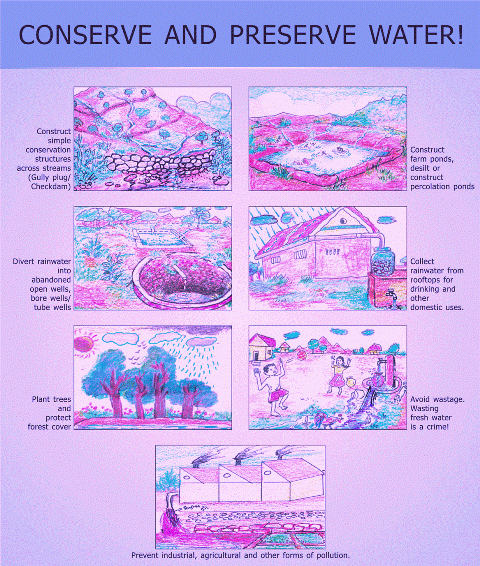India, May 08, 2006The death toll in a heatwave that has affected much of northern India in recent days has now reached 34 lives today (Monday, May 8). Temperatures across most of northern India have reached 110 degrees Fahrenheit (43 C), about four or five degrees above normal, for the past few days. In northwestern Rajasthan state, temperatures reached 48 degrees Celsius (118 F), while western Maharashtra state recorded 47 degrees Celsius (117 F). At least 24 have people reportedly died in northern Uttar Pradesh state, which has also been hit by frequent power shortages that have set off protests. At least 21 people were arrested in Uttar Pradesh last Friday (May 5) after angry residents clashed with power utility workers. In the eastern state of Orissa, at least 10 other people were reportedly killed. All of the casualties were homeless. Schools in Uttar Pradesh have been ordered to close a week early for the summer, while authorities in New Delhi have ordered people to shut down air conditioners in the evening and at night. Parts of the city have been without power for as much as five or six hours a day for the past two weeks, causing frustration among residents. The power shortage has also resulted in a water supply shortage as power is used to pump water in some areas. Officials say that about 35% of total power generated in New Delhi is stolen, mostly by private individuals that illegally connect to transmission lines. The Indian Meteorological Department (IMD) said yesterday (Sunday, May 7) that although temperatures were not expected to rise further, they were not likely to decrease in the next two days. Heatwaves are an annual occurrence in India and often take place before the arrival of the monsoon season in June. Last year, more than 320 people were killed in India’s pre-monsoon heatwave. Most of the casualties typically are homeless people who cannot afford power for air conditioning or electric fans to cool down.
The mission of the social work profession is rooted in a set of core values. These core values, embraced by social workers throughout the profession's history, are the foundation of social work's unique purpose and perspective: *service *social justice *dignity and worth of the person *importance of human relationships *integrity *competence.
Search This Blog
Subscribe to:
Post Comments (Atom)
Biodata, Resume and CV

Social Issues Headline Animator
Popular Posts
-
History of Social Work Thanks: Thiru. S. Rengasamy, Lecturer, MISS, Tamil Nadu, India
-
THIS INDENTURE made at (name of City/Town/Village), this (date) day of (month) 19 (year), BETWEEN Mr./Mrs./Ms.______________________________...
-
Tamilnadu Vazhndhu Kaattuvom Project is an empowerment and poverty alleviation project implemented by the Rural Development and Panchayat Ra...
-
If you want something you never had, do something you have never don e........ As the new year blossoms, may the journey of your life be fra...
-
I. Summary A. Types of Organizations 1. Trusts Public...
-
Set up with financial resources contributed by Azim Premji, Chairman, Wipro Corporation, Azim Premji Foundation aims at making a tangible im...
-
Understanding the Narcissistic Phenomenon The so called ‘narcissistic personality disorder’ is a complex and often misunderstood diso...
-
Introduction A public charitable or religious institution can be f...
-
If you were given the task of setting up a new Human Resource Department in a small company where would you begin? Such a task would be extr...
-
Behavior Change Communication (BCC) is a tool for promoting and sustaining risk-reducing behavior change in individuals and communit...


My Headlines

Guidelines to set up a NGO or NPO
- Procedures for registering a NGO under Trust, Society and not-for-profit Companies act
- Starting a NGO or a NPO
- Registeration of a NGO under the Societies Registeration Act
- Formation, registeration and transfering the property of a Trust
- Article of Association format
- Income-tax Act procedure for an NGO
- Registering an NGO under Companies Act
- Registration of a NGO under under Foreign Contribution (Regulation) Act, 1976 (FCRA)
- Fund raising methodology for running a NGO / NPO
- Trust Deed sample
Disclaimer:
This blog is designed to provide and encourage access within the social work community to sources of current and comprehensive information. Therefore, Indiansocialworker.blogspot.com itself places no restrictions on the use or distribution of the data contained therein.
Some Indiansocialworker.blogspot.com web pages may provide links to other Internet sites for the convenience of users. Indiansocialworker.blogspot.com is not responsible for the availability or content of these external sites, nor does Indiansocialworker.blogspot.com endorse, warrant, or guarantee the products, services, or information described or offered at these other Internet sites. Users cannot assume that the external sites will abide by the same Privacy Policy to which Indiansocialworker.blogspot.com adheres. It is the responsibility of the user to examine the copyright and licensing restrictions of linked pages and to secure all necessary permissions.
- Indian Social Worker Team
Some Indiansocialworker.blogspot.com web pages may provide links to other Internet sites for the convenience of users. Indiansocialworker.blogspot.com is not responsible for the availability or content of these external sites, nor does Indiansocialworker.blogspot.com endorse, warrant, or guarantee the products, services, or information described or offered at these other Internet sites. Users cannot assume that the external sites will abide by the same Privacy Policy to which Indiansocialworker.blogspot.com adheres. It is the responsibility of the user to examine the copyright and licensing restrictions of linked pages and to secure all necessary permissions.
- Indian Social Worker Team


No comments:
Post a Comment